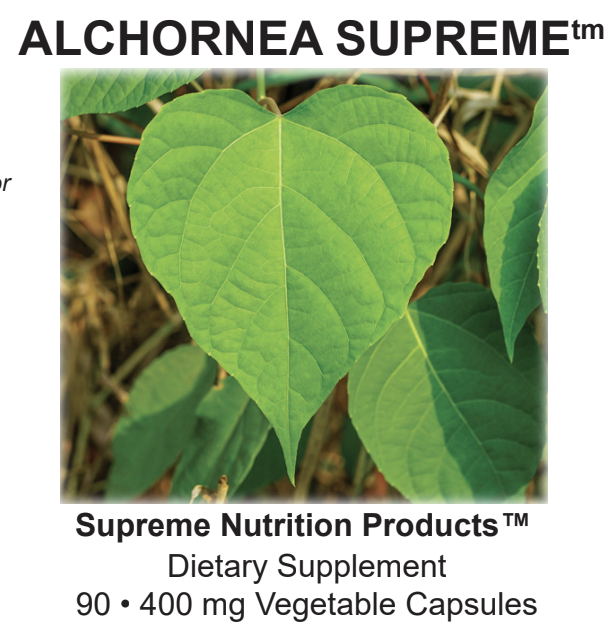Alchornea Supreme
It has been a goal of Supreme Nutrition products to produce products
from the world’s best herbal antimicrobials. With more and more people
with compromised immune systems due to chemical and metal exposure,
increased emfs and mold in the environment, nutrient deficiencies,
stress of living in the 21st century etc. plus the rapid mutation of
many pathogens having a pharmacy of herbal antimicrobials is
incredibly beneficial to the physician as well as the average family.
Our latest addition is Alchornea Supreme (Alchornea Cordifolia). Also
known as Christmas bush, this plant has been used in traditional
African medicine for many centuries. In the Congo it is often used as
a tea to treat various maladies, including: diarrhea, fever,
respiratory infections, malaria and various skin conditions including
psoriasis (1).
It has broad spectrum anti-bacterial properties including against
pseudomonas species, klebsiella, S. aureus, strep mutans and e. coli
(3,5,6). In Africa it has been shown to be hepatoprotective, have
antidepressant properties, anticancer properties, and is a strong
antioxidant (4)
Alchornea also has been shown to have strong anti-fungal properties
against candida, microsporum and aspergillus species. In Cameroon it
is routinely used to treat uro-genetal infections (8).
Physicians in the lyme community have found it very useful in the
treatment of ehrlichia, bartonella, and babesia species as well as
chlamydia and various mycoplasma (7).
Since research is limited we advise not taking it if pregnant,
breastfeeding or while on blood thinning medication.
Dose 1-2 caps 3x daily
1. Alchornea cordifolia. "Alchornea cordifolia". Useful Tropical
Plants. (Schumach. & Thonn.) Müll.Arg. Retrieved 28 September 2020.
2. Agbor, Gabriel A., Talla Léopold, and Ngogang Y. Jeanne. "The
antidiarrhoeal activity of Alchornea cordifolia leaf extract."
Phytotherapy Research: An International Journal Devoted to
Pharmacological and Toxicological Evaluation of Natural Product
Derivatives 18.11 (2004): 873-876.
3. Ebi, G. C. "Antimicrobial activities of Alchornea cordifolia."
Fitoterapia 72.1 (2001): 69-72 Concerns Pseudomonas aeruginosa,
Bacillus subtilis and Escherichia coli.
4. Boniface, Pone Kamdem, Sabrina Baptista Ferreira, and Carlos Roland
Kaiser. "Recent trends in phytochemistry, ethnobotany and
pharmacological significance of Alchornea cordifolia (Schumach. &
Thonn.) Muell. Arg." Journal of Ethnopharmacology 191 (2016): 216-244
5. Noundou, X. Siwe, et al. "Antibacterial effects of Alchornea
cordifolia (Schumach. and Thonn.) Müll. Arg extracts and compounds on
gastrointestinal, skin, respiratory and urinary tract pathogens."
Journal of Ethnopharmacology 179 (2016): 76-82
6. Muanza, D. N., et al. "Antibacterial and antifungal activities of
nine medicinal plants from Zaire." International Journal of
Pharmacognosy 32.4 (1994): 337-345
7. Various conversations with physicians and recommended by Stephen Buhner
8. Djimeli, M.N., Fodouop, S.P.C., Njateng, G.S.S. et al.
Antibacterial activities and toxicological study of the aqueous
extract from leaves of Alchornea cordifolia (Euphorbiaceae). BMC
Complement Altern Med 17, 349 (2017).
https://doi.org/10.1186/s12906
